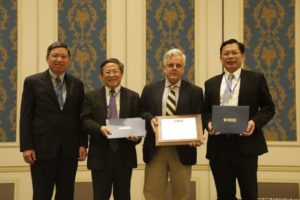The IEEE Transactions on Nanotechnology (TNANO) seeks original manuscripts for a Special Section on: “Micro/Nanorobotics and its biomedical applications”
Micro/nanorobotics is an emerging field of developing robotic devices to perform tasks (e.g., actuation, sensing, manipulation, propulsion, signaling, information processing, intelligence, and swarm behaviors) at the micro/nano scale. Micro/nanorobotic systems can themselves be miniature in size (often called micro/nanorobot), or they may be designed to interact with micro/nano-sized matters (often called micro/nanomanipulator). In the past decade, the huge achievements of micro/nanorobotics are realizing the dream described in the film Fantastic Voyage and show the extraordinary potentials for advancing biomedicine (e.g., drug delivery, precision surgery, medical diagnostics, and targeted therapy), significantly offering novel possibilities for bridging biomedicine and robotics.
This special issue covers the important and influential topics of micro/nanorobotics (including micro/nanorobots and micro/nanomanipulators) and its biomedical applications. Additionally, the potential and valuable directions of further research will be addressed. The guest editors look forward to collecting a set of recent advances in the related topics, to provide a platform for bridging researchers associated with micro/nanorobotics from multidisciplinary fields including engineering, information, biomedicine, materials, chemistry, and physics.
Relevant topics of interest to this special section include (but are not limited to):
- Micro/Nanorobots and micro/nanomanipulators
- Micro/Nanorobotics, nanotechnology, MEMS and automation
- Novel concepts, materials, fabrications, and designs for micro/nanorobotics
- Novel sensing, actuation and control techniques/theories for micro/nanorobotics
- In vivo and in vitro biomedical applications of micro/nanorobots
- Applications of micro/nanomanipulators for biological characterizations, manipulations, and measurements
Follow the guideline (http://site.ieee.org/tnano/author-info/), and submit your paper to ScholarOne Manuscripts at http://mc.manuscriptcentral.com/tnano, indicating in the cover letter that you wish the paper to be considered for “IEEE Transactions on Nanotechnology (TNANO) Special Section on “Micro/Nanorobotics and its biomedical applications”. Please note that the type of submissions is Regular Manuscripts, i.e., 4 to 8 pages in the two-column IEEE format, which includes figures, tables, and references. On submission to TNANO, authors should select the “Special Issue” manuscript type instead of “Regular Paper”.
Manuscripts will be subject to the standard competitive and constructive peer-review TNANO criteria with no article publishing charges. Accepted papers are published on the web in IEEE Xplore as soon as they are submitted in final form. Web-published papers have a DOI (Digital Object Identifier), and are fully citable and downloadable.
Important Dates
- Submission deadline: July 15, 2020
- First decision (accept/reject/revise): October 1, 2020
- Revised papers submission: December 1, 2020
- Final decision: December 31, 2020
Guest Editors
Prof. Lianqing Liu (Leading guest editor) Shenyang Institute of Automation, Chinese Academy of Sciences, Shenyang, China. E-mail: lqliu@sia.cn
Prof. Lixin Dong Department of Biomedical Engineering, City University of Hong Kong, Hong Kong SAR, China. E-mail: lixidong@cityu.edu.hk
Prof. Guangyong Li Department of Electrical & Computer Engineering, University of Pittsburgh, Pittsburgh, USA. E-mail: gul6@pitt.edu
Responsible T-NANO Senior Editor: Prof. Osamu Tabata


